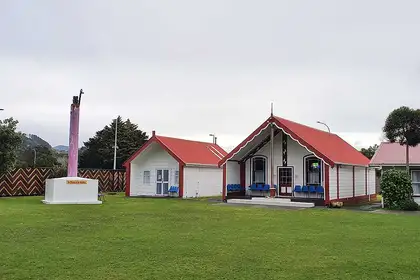
Whakarongotai Marae in Waikanae, which has in the past been mobilised to deal with disasters. Photo by C. Kenney.
Massey University has secured funding from the Earthquake Commission’s (EQC) 2020-2023 University Research Grant Programme to establish a new centre for Mātauranga Māori disaster research.
The grant is one of eight awarded nationally, and constitutes the first significant investment by the EQC in Māori research capability development in New Zealand.
The collaborative project is led by Associate Professor Christine Kenney (Te Āti Awa, Ngāti Awa ki Kāpiti, Ngāti Toarangatira, Ngāi Tahu) from the Joint Centre for Disaster Research, with the multi-disciplinary team including Associate Professor Jon Procter (Muaūpoko, Ngāti Apa, Ngāi Tahu) and Dr Acushla Sciascia (Ngāruahine Rangi, Ngāti Ruanui and Te Āti Awa) from the School of Agriculture and Environment, and senior lecturer Dr Suzanne Phibbs (Ngāi Tahu) from the School of Health Sciences.
The funding will enable the creation of the EQC Mātauranga Māori Disaster Risk Reduction Research Centre, which will be hosted at Massey’s Joint Centre for Disaster Research in Wellington with additional support provided by the College of Sciences. The new research hub will progress the development and leveraging of Mātauranga Māori by Māori researchers and Māori community research partners to enable New Zealand’s resilience to natural hazards.
The research centre will provide a ground-breaking approach to advancing Mātauranga Māori researcher capability, and create science tools that will achieve both EQC’s core objectives and respond to its obligations pertaining to the Treaty of Waitangi.

Associate Professor Christine Kenney.
Associate Professor Christine Kenney, the centre’s director, says it will be a mission-led enterprise responsive to EQC’s key research interests and goals but with an equally broad focus on addressing iwi, hapū and whānau concerns pertaining to disasters. Research will be designed and conducted by Māori researchers in accordance with foundational Māori research principles and in response to Māori aspirations relating to disaster resilience and research capability development. Planned projects encompass safe housing, climate change and flood impacts, land use planning, digitised risk profiling, community resilience, disaster risk reduction, emergency management and urban design.
“We think it will contribute to a resilient New Zealand through intersecting Mātauranga Māori developed in this research programme with science knowledge. Our aim to is develop Māori research and researcher capability over time, both within the Centre and in our communities.”
The programme will focus on the generation and application of Mātauranga Māori to shape new risk reduction knowledges and showcase the interconnectedness of all aspects of natural hazard risks and catastrophic events, using a Māori viewpoint. “We will also investigate augmented methods for communicating Māori science to decision-makers, policy-makers, practitioners, and the public,” says Associate Professor Kenney.
Initiatives will address culturally-informed urban planning and design, boosted land performance from integration of iwi management plans into regional planning, the expedited development of hazard risk management tools, reinforced iwi relationships with their lands and resources, and also improved assessment of resilience using context-specific measures.
Associate Professor Kenney says the research leadership team’s established networks in Te Ao Māori will enable communication of quality research advice, as well as promotion of resilience science, research and knowledge sharing, responsive to the risk reduction needs of Māori end-users, EQC and other actors in the sector.
The grant is a part of a revamped $3 million University Research Programme to support EQC’s aim of building New Zealand’s resilience to natural hazards. The funding is $125,000 per year for three years and is based on the delivery of a three-year research programme that aligns with EQC’s Resilience Strategy, with the possibility of the funding being renewed for a further period.